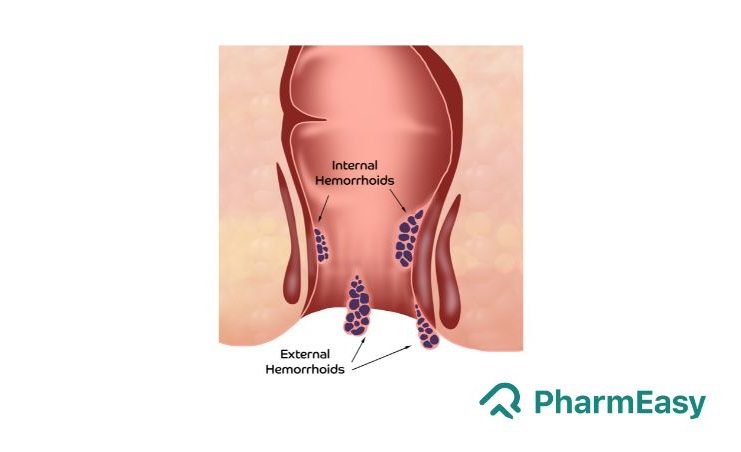Piles in Male (Men): Symptoms, Causes, and Treatment
By Dr. Mayuri Pandey +2 more

Get,

to manage your symptom
Get your,


4 Cr+ families
benefitted

OTP sent to 9988776655



You’ve successfully subscribed to receive
doctor-approved tips on
Whatsapp

Get ready to feel your best.

Hi There,



Register to Avail the Offer
Send OTPBy continuing, you agree with our Privacy Policy and Terms and Conditions

Hi There,

Trusted by 4 crore+ families

OTP sent to 9988776655



You have unlocked 25% off on medicines




Code: NU25

By Dr. Mayuri Pandey +2 more
Table of Contents
If you are experiencing pain, discomfort, and itchiness in the region near your anal opening, there is a possibility you are suffering from piles. Piles are enlarged, swollen lumps seen in the area of your anal opening and rectum. Piles are commonly referred to as haemorrhoids and can occur in males and females, commonly noticed between the ages of 45 to 65 years. Males are affected more than females as activities such as weight lifting and other strenuous activities contribute to the development of piles in males.1
Based on the location, piles can be internal or external. Internal haemorrhoids are seen inside the rectum and are not visible to the naked eye. External haemorrhoids often are noticed near the anal opening.

The commonly asked questions include: Why do piles occur in males? What causes piles in males? Piles commonly occur in males due to increased pressure in the lower rectum. Piles can occur at any age but are more prevalent in elderly individuals. If you suspect you have piles, seek medical care and get treatment immediately. Untreated piles can lead to complications that can be avoided with urgent care.
Around 40% of haemorrhoids are painless and asymptomatic. On the other hand, the early symptoms of piles in male patients are:
The early symptoms of piles in males are mild and cause little discomfort. As it progresses, the symptoms of piles in males noticed are: 2
It is important for patients to seek medical consultation in cases of rectal bleeding, especially in middle and older-aged individuals, as the risk of malignancy is higher in these groups. It should not be automatically assumed that Rectal bleeding is piles.
Dr. M.G. Kartheeka, MBBS, MD
Reason for piles in males include: 3,4
Piles, if left untreated, could lead to various complications. These include:5
Also Read: How to Stop Itchy Anus at Night: Effective, Research-Backed Solutions
The doctor will ask you about your main complaint and the symptoms you have been experiencing. Any relevant past and present family and medical histories should be discussed, as this is essential while treating piles. The doctor will also inquire about your eating habits, bathroom routines, use of enema and laxatives, and any current medications.
The region of your anal opening and the lower rectum will be examined for:
Read More: 8 Best Home Remedies For Piles
Haemorrhoids are usually treated by proctologists. Based on the severity of your condition, the doctor may recommend diet and lifestyle modifications, medications, and surgical or non-surgical options for your treatment.
Medication help reduces the severity of symptoms of piles in males.
The doctor may prescribe a non-surgical line of treatment for low-grade piles. These procedures include:
The surgical management of piles includes the following procedures:
Consult a healthcare professional to figure out the best course of action for the treatment of haemorrhoids.
Read more: What is the Cost of Piles Surgery in India?
Symptoms of piles in males include pain and itchiness in the anal region, blood in stool, mucous discharge, swelling, and lumps.
Piles are caused by enlarged veins in the area of your anal opening or the rectum. This occurs due to increased pressure of the blood vessels during constipation, straining during bowel movements, advancing age, obesity, strenuous activities, and a low-fibre diet.
If the right medical treatment is followed, haemorrhoids do not cause any complications. Untreated haemorrhoids may lead to blood loss, skin tags, and fissures in the area of the anal opening, and may cause excruciating pain.
Depending on the severity of your condition, the doctor will either prescribe medications, lifestyle modifications, and surgical and non-surgical treatment options for the treatment of piles in males.
The main effects of piles in males include swelling and lumps, inflammation, blood in stool, and mucous discharge.
Disclaimer: The information included on this site is for educational purposes only and is not intended to be a substitute for medical treatment by a healthcare professional. Because of unique individual needs, the reader should consult their physician to determine the appropriateness of the information for the reader’s situation.

Leave your comment...
Comments